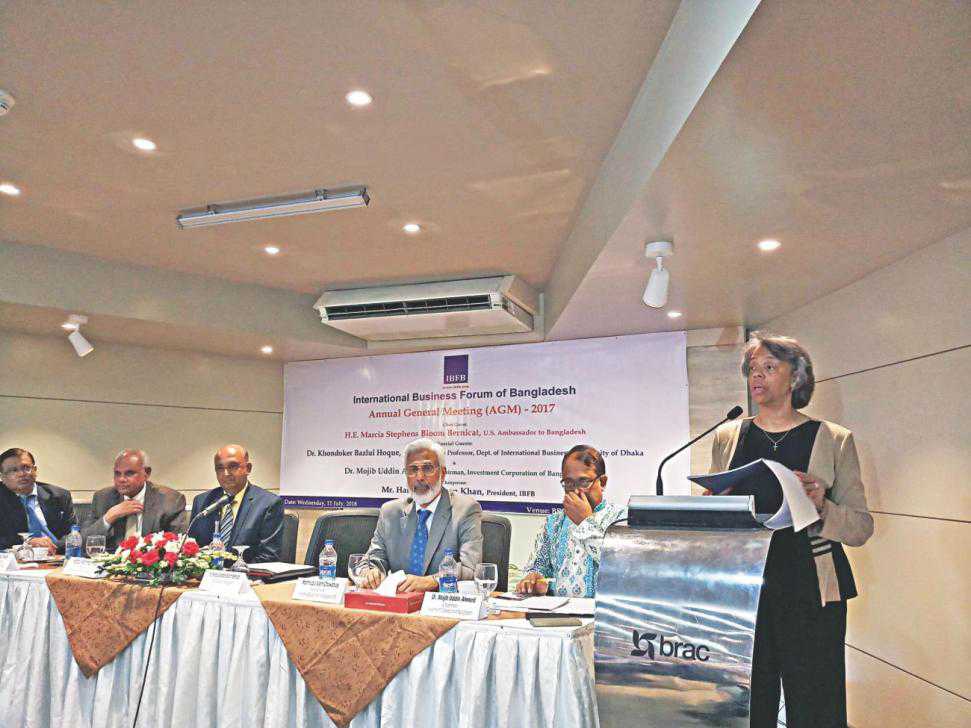Form policy to let local firms invest abroad
12 July, 2018

The government needs to formulate a specific policy to allow local companies to invest abroad as many domestic industrial conglomerates are now capable of doing so, a top official of a leading trade body said yesterday.
Some local companies have started making overseas investments but those got permission as the central bank has been looking into each of those case by case, not broadly under any policy framework, he said.
“Many Bangladeshi enterprises have acquired adequate technical knowledge and financial capacities to compete in international markets,” said Hafizur Rahman Khan, the outgoing president of the International Business Forum of Bangladesh (IBFB).
“With approval from the government they have already expanded their operations abroad and doing very good business,” he said at IBFB's annual general meeting for 2017 at Brac Centre Inn in Dhaka.
“IBFB earnestly requests the government to make a specific policy for allowing overseas investment by Bangladeshi entrepreneurs.”
He also urged the US government to set up two trade centres in Dhaka and Chittagong so that local businesspeople could easily exchange information on bilateral trade and investment issues.
Manpower has been increased in an existing trade centre inside the US embassy in Dhaka to provide better services to local businesspeople, Marcia Bernicat, US ambassador to Bangladesh, said at the meeting.
Bernicat said she has been working on bringing more US foreign direct investment (FDI) in Bangladesh, pointing out that US was currently the largest source of FDI—23 percent of the total—for Bangladesh.
For instance, of the natural gas being used in Bangladesh, 50 percent is being extracted by US company Chevron Bangladesh but 90 percent of its employees are locals, she said.
“To make stories like Chevron possible the embassy is committed to promoting the business-friendly environment,” she said.
However, the local private sector entrepreneurs must play key roles in maintaining fair labour standards and provisions and protect intellectual property rights, said Bernicat.
“During my nearly three years in Bangladesh I have made it my priority to advocate and fight for the US companies and to help counter unfair trade barriers…US businesses do well here. But it can do so much better,” she said.
High tariffs, unnecessary or arbitrary regulations, certain tendering processes, weak trade facilitation, cumbersome customs procedures, tax audits that reach back beyond the companies' history here, corruption and sanitary and phyto sanitary tests that lack scientific basis are some of those barriers for foreign and local investors, she said.
Those along with issues related to greater market access would be discussed broadly in the next Trade and Investment Cooperation Forum Agreement meeting between the two countries, she said.
She said the USAID has been working with the National Board of Revenue to implement the trade facilitation agreement of the World Trade Organisation, of which Bangladesh was a signatory. Bernicat said US exports to Bangladesh increased 61 percent year-on-year to $1.74 billion last year.
The US has already appointed agricultural attaches in the embassy as the export of agricultural products to Bangladesh has been increasing substantially, she said.
In 2004, when the IBFB was established with the help of USAID, Bangladesh's export to the US was only $2.4 billion and last fiscal year the country's export was $6 billion, she said.
Khondoker Bazlul Hoque, a professor of the University of Dhaka, said implementation of mega projects would change the face of the country and the private sector played a wonderful role in developing and bringing the country to this stage.
“Nagging inequality, soaring corruption and environmental degradation must be stopped, otherwise all achievement would be maligned,” he said.
Mojib Uddin Ahamed, chairman of the Investment Corporation of Bangladesh, and Mahmudul Islam Chowdhury, founding IBFB president, also spoke.
